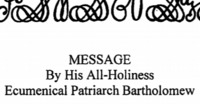Search
41 items
-
Engaged Organizations: Mercy Ecospirituality Center
Mercy Ecospirituality Center discuss their various environmental/spiritual offerings of their retreat center on their website:
"Mercy Ecospirituality Center of Mercy Ecology, Inc. is a sponsored work of the Sisters of Mercy. We are committed to reflection, education and living gently in mutual relationship with the Earth. We offer hospitality for those seeking solace and to refresh their spirit in the beauty of creation, as well as programs in ecospirituality.
The Benedictine monks of Elmira, NY gave the 39-acre property located in the rural beauty of Vermont to the Vermont Sisters of Mercy. Sisters Judy Fortune and Elaine Deasy directed it as Lumen Christi Retreat House for many years, but after Lumen Christi closed, a group of Sisters established it as an Ecospirituality Center, originally named Mercy Farm in 2010." -
Engaged Organizations: New Dawn Earth Center
New Dawn Earth Center offers sustainability educational programs and activities for both children and adults. As indicated on their Facebook website:
"The New Dawn Earth Center invites everyone to learn from, honor and celebrate the interconnectedness of all life. We aim to create a space where humans can be in relationship with Earth and thereby nurture their own spirit." -
Shinto Faith Statement on the Environment
Shintoism belief system maintains that all earthly entities have their own spirituality and that the natural environment and people are of blood kin. The Interfaith Center for Sustainable Development posted a Shinto faith statement on the environment, prepared by the Jinja Honcho (the representative body of all Shinto Shrines in Japan) on their website. -
Daoist Faith Statement on the Environment
The Interfaith Center for Sustainable Development posted a Daoist faith statement from The China Daoist Association on the environment on their website. The following statement excerpt is shown below:
"With the deepening world environmental crisis, more and more people have come to realize that the problem of the environment not only is brought about by modern industry and technology, but also has a deep connection with people’s world outlook, with their sense of value, and with the way they structure knowledge. Some people’s ways of thinking have, in certain ways, unbalanced the harmonious relationship between human beings and nature, and overstressed the power and influence of the human will. People think that nature can be rapaciously exploited.
This philosophy is the ideological root of the current serious environmental and ecological crisis. On the one hand, it brings about high productivity; on the other hand, it brings about an exaggerated sense of one’s own importance. Confronted with the destruction of the Earth, we have to conduct a thorough self-examination on this way of thinking." -
Confucian Statement on the Environment
This Confucian statement on the environment discusses the importance of appreciating the beauty of nature. Human exploitation has disrupted this beauty, causing an imbalance in harmony among all forms of life. Interfaith Center for Sustainable Development has posted the following statement on its website: -
Zoroastrian Ecology
The Interfaith Center for Sustainability posted a Zoroastrian statement on ecology on their website. The following is an excerpt discussing the seven bounteous creations:
"The role of mankind in the world is to serve and honor not just the Wise Lord but the Seven Bounteous Creations of the sky, water, earth, plants, animals, man, and fire—gifts of God on High to mankind on earth.
The great strength of the Zoroastrian faith is that it enjoins the caring of the physical world not merely to seek spiritual salvation, but because human beings, as the purposeful creation of God, are seen as the natural motivators or overseers of the Seven Creations. As the only conscious creation, mankind has the ultimate task of caring for the universe." -
Druze Theology of the Forests
A Druze theology of the forests statement emphasizes human responsibility to care for the Earth to maintain life harmony. There is a specific emphasis on forests and similar nature areas as these are conducive to worship and meditation. Interfaith Center for Sustainable Development posted the following statement excerpt on their website:
"Forests and natural reserves are sites conducive to worship, meditation and going beyond yourself and the purely material. But does this happen through misuse, avarice and destruction of the forests? Of course not. It happens because of an appreciation – through the forests – of the divine grace and wisdom in ordering the universe and placing the mind as an arbitrator that decides what could be beneficial and what is an impermissible violation. This is exactly as in our daily lives both for ourselves and our society where it is possible for us to transform suffering into joy, emotion into blessing and nature into a source of bliss and worship." -
Sufism Ecology
This Sufism ecology statement posits that nature takes a central position in life - a place where one can find truth. Conservation and protection of the natural environment is a spiritual priority with the Sufism faith. The Interfaith Center for Sustainable Development posted this Sufism ecology statement on their website: -
Baha'i Faith Statement on the Environment
The Interfaith Center for Sustainable Development posted a Baha'i faith statement, from the Baha'i Office of the Environment, on their website. Below is the introduction within the statement:
"In this age of transition toward a world society, protection of the environment and conservation of the earth’s resources represent an enormously complex challenge. The rapid progress in science and technology that has united the world physically has also greatly accelerated destruction of the biological diversity and rich natural heritage with which the planet has been endowed. Material civilization, driven by the dogmas of consumerism and aggressive individualism and disoriented by the weakening of moral standards and spiritual values, has been carried to excess.
Only a comprehensive vision of a global society, supported by universal values and principles, can inspire individuals to take responsibility for the long-term care and protection of the natural environment. Baha’is find such a world-embracing vision and system of values in the teachings of Baha’u’llah, which herald an era of planetary justice, prosperity, and unity. " -
Hindu Ecology
Among other philosophical beliefs of Hinduism, adherents advocate for the sacredness of all life forms, simple living, and inner peace. This Hindu statement on ecology, compiled and edited by Ranchor Prime and published by the World Bank in 2003, is posted on the website for Interfaith Center for Sustainable Development: -
Sikh Faith Statement on the Environment
This Sikh faith statement on the environment, based on the 1995 Windsor Statements, is posted on the Interfaith Center for Sustainable Development. Below is the introduction to the statement:
"The Sikh scripture, Guru Granth Sahib, declares that the purpose of human beings is to achieve a blissful state and to be in harmony with the earth and all creation. It seems, however, that humans have drifted away from that ideal. For the earth is today saturated with problems. It is agonizing over the fate of its inhabitants and their future! It is in peril as never before. Its lakes and rivers are being choked, killing its marine life. Its forests are being denuded. A smoky haze envelops the cities of the world. Human beings are exploiting human beings." -
Buddhist Faith Statement on the Environment
Interfaith Center for Sustainable Development posted a Buddhist faith statement on the environment on their website. According to the Vietnamese monk Venerable Thich Nhat Hanh:
“Buddhists believe that the reality of the interconnectedness of human beings, society and Nature will reveal itself more and more to us as we gradually recover—as we gradually cease to be possessed by anxiety, fear, and the dispersion of the mind. Among the three—human beings, society, and Nature—it is us who begin to effect change. But in order to effect change we must recover ourselves, one must be whole. Since this requires the kind of environment favorable to one’s healing, one must seek the kind of lifestyle that is free from the destruction of one’s humanness. Efforts to change the environment and to change oneself are both necessary. But we know how difficult it is to change the environment if individuals themselves are not in a state of equilibrium.” -
Christian Ecology
Interfaith Center for Sustainability Development posted a Christian ecology statement, based on the 1995 Windsor Statements, on their website. The following is an excerpt discussing the challenges that have persisted over time with regard to the care for creation:
"In the words of the Orthodox Patriarchate, ‘This may well mean that just as a shepherd will in times of greatest hazard lay down his life for his flock, so human beings may need to forego part of their wants and needs in order that the survival of the natural world can be assured.'
The challenge to all Christians is to discover anew the truth that God’s love and liberation is for all creation, not just humanity, and to seek new ways of living that restore balance and hope of life to the endangered planet." -
Pope Francis' Speech on UN World Environment Day
Pope Francis's speech on the United Nations World Environment Day emphasizes the importance of world solidarity to counter what he deems a current culture of waste. One prevailing message is the danger of consumerism. The pope extends a challenges to forgo excessive wealth in exchange for living a more simplistic lifestyle, which can help combat world health and hunger issues. -
Common Declaration on Environmental Ethics
On June 10, 2002, Pope John Paul II and Ecumenical Patriarch Bartholomew I issued a declaration on the environment. The introduction to the declaration is stated below:
"We are gathered here today in the spirit of peace for the good of all human beings and for the care of creation. At this moment in history, at the beginning of the third millennium, we are saddened to see the daily suffering of a great number of people from violence, starvation, poverty and disease. We are also concerned about the negative consequences for humanity and for all creation resulting from the degradation of some basic natural resources such as water, air and land, brought about by an economic and technological progress which does not recognize and take into account its limits." -
Message by His All-Holiness Ecumenical Patriarch Bartholomew to the United Nations Conference of the Parties (COP 24) (Poland)
Ecumenical Patriarch Bartholomew I of Constantinople addressed the United Nations of the Parties (COP 24) in Poland, December 3-14, 2018. He emphasized the collective responsibility among all citizens to alleviate the climate problems. One key point includes the urgency to focus on lighter carbon footprints to preserve the Earth to assist in alleviating poverty and suffering.
















